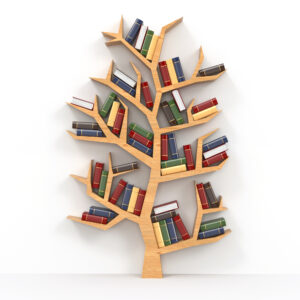Bibliotherapy in School and the role of School Librarians
Bibliotherapy in School and the Role of School Librarians
Sigy George
What is Bibliotherapy?
Bibliotherapy is a type of therapy that makes use of literature to assist clients in resolving emotional, interpersonal, or behavioural issues. It is a strategy for using reading to advance mental health and wellbeing. From private consultations with a mental health expert to reading circles facilitated by a school librarian, bibliotherapy can take many different forms. The books used in bibliotherapy are specifically selected to address the issues that the individual or group is dealing with.
Bibliotherapy has been used to treat a variety of conditions, including trauma, bereavement, anxiety, and depression. Children and young people who might find it challenging to verbally express their emotions find it very helpful. They can acquire coping mechanisms and explore their emotions through bibliotherapy in a secure and non-threatening environment.
—Bibliotherapy is a powerful tool for promoting mental health and well-being in schools.—
Bibliotherapy in Schools
In recent years, bibliotherapy has grown in acceptance in educational settings. Schools are realising how crucial it is to address kids’ mental health and wellbeing, and bibliotherapy is one strategy for doing so. Since school libraries already have a plethora of books available, they are the ideal location to establish bibliotherapy programmes.
There are numerous approaches to implement bibliotherapy in classrooms. Making reading clubs that are conducted by the school librarian is one strategy. The books selected for the group will speak to this subject. For example, the reading group may concentrate on the topic of bullying or anxiousness. The group might come together frequently to go over the books and debate the themes. Students who could be having similar problems and would benefit from hearing about others’ experiences can benefit the most from this method.

Making displays of books that address particular difficulties is another approach to employ bibliotherapy in classrooms. After a student or member of the staff has gone away, for instance, a collection of literature on sorrow can be put on display. Students who might be having trouble coping with their loss and require support can be given access to the books. The year-round promotion of mental health and wellbeing can also be accomplished with this strategy. To assist students who might be struggling with these concerns, displays of literature on anxiety, depression, or other topics can be made.
The Role of School Librarians
School librarians play a vital role in implementing bibliotherapy programs in schools. They are often the ones who select the books that will be used in the programs and can provide guidance to teachers and students on how to use the books effectively. School librarians can also create displays of books and other resources that promote mental health and well-being.
In order to implement bibliotherapy programs effectively, school librarians need to be familiar with the literature available on various issues. They should have a good understanding of the books that can be used to address different emotional and behavioral issues. School librarians should also be trained in how to lead reading groups and facilitate discussions about the books. School librarians play a crucial role in implementing bibliotherapy programs in schools, and their contributions go beyond just selecting and promoting books.
Here are some additional ways in which school librarians can support bibliotherapy programs in schools:
1. Collection Development: A school librarian can genrify the library collection according to the themes/genres or have stickers which highlight a specific genre/ theme. This would help students in accessing the materials that they need. Creating book displays or booklists that focus on specific themes, such as grief, anxiety, or self-esteem. Librarians can highlight books that deal with these issues and make them easy for students to find. Alternatively, a school librarian can create a collection of graphic novels that address mental health themes, such as depression, anxiety, or addiction. These books can provide an alternative way for students to engage with difficult topics and help them understand their own experiences.
2. Creating a welcoming environment: School librarians may make the library a welcoming and cosy place where students can read and unwind. Students may feel more at ease exploring their emotions and talking about delicate subjects as a result. The environment can be further enhanced by the librarian with soothing colours, cosy furniture, and other components that encourage unwinding and mindfulness. Providing a space for students to journal or write about their feelings. The librarian can provide prompts and writing resources to help students express themselves and reflect on their experiences.
4. Working together with teachers: To incorporate bibliotherapy into the classroom, school librarians can work with teachers. They may propose books that complement the curriculum or suggest exercises that encourage students to delve further into the books’ subjects. This partnership can ensure that the bibliotherapy programme is incorporated into the students’ overall educational experience.
3. Providing resources: School librarians can offer other materials that promote mental health and well-being in addition to literature. For instance, they can offer details about nearby mental health facilities, self-care methods, and other useful resources that students could find. Students may feel more empowered to look after their mental health as a result of this.
4. Leading talks: Hosting book clubs or reading groups that focus on books with therapeutic themes . Bibliotherapy programmes can engage school librarians to lead conversations regarding the books being used in the therapy sessions. They can organise reading groups or book clubs where students can discuss the works and delve deeper into the subjects. Students may have the chance to share their experiences, gain from one another, and create new coping mechanisms during these sessions. Librarians can facilitate discussions and provide a safe space for students to talk about their feelings and connect with others who are going through similar experiences.
5. Providing advice: Providing one-on-one book recommendations to students who are struggling with emotional or mental health issues. Librarians can talk to students about their interests and needs, and recommend books that might help them cope with their challenges. Students who are having emotional or behavioural problems can get advice from school librarians. They can pay attention to students’ worries and suggest books or other useful resources. They can also give pupils a place where they feel comfortable talking about their emotions without being judged.
Conclusion
Bibliotherapy is a powerful tool for promoting mental health and well-being in schools. It provides a safe and non-threatening way for children and young adults to explore their feelings and learn coping strategies. Schools and school librarians can play a vital role in implementing bibliotherapy programs and promoting mental health.
It can be used in various ways, from reading groups to book displays, and can provide a safe and effective way for children and young adults to work through emotional and behavioral issues. School librarians are essential to the implementation of bibliotherapy programs and can provide valuable support to students and staff. By working together, schools and school librarians can create a supportive environment that promotes mental health and well-being for all students.
It is important to note that bibliotherapy is not a substitute for professional mental health care. Students who are experiencing serious emotional or behavioral issues should be referred to a mental health professional. However, bibliotherapy can be a valuable addition to a student’s support system, providing them with a safe and non-threatening way to explore their feelings.
References
American Association of School Librarians. (2018). National School Library Standards for Learners, School Librarians, and School Libraries. American Library Association.
American School Counselor Association. (2018). Mindsets and behaviors for student success: K-12 college- and career-readiness standards for every student. ASCA.
Aubry, Timothy. (2011). Reading as therapy: What contemporary fiction does for middle-class Americans. University of Iowa Press.
Chadbourne, Sherry P. (1976). Bibliotherapy: An Overview and the Librarian’s Role. U.S. Department of Education.
Moreillon, J. (2018). Maximizing school librarian leadership: Building connections for learning and advocacy. American Library Association.
Morgan, P. G. (2015). Bibliotherapy with young people: Librarians and mental health professionals working together. Libraries Unlimited.
National Association of School Psychologists. (2018). Addressing mental health concerns in schools: A guide for school administrators and school psychologists. NASP.
National Institute of Mental Health. (n.d.). Help for mental illnesses. Retrieved from https://www.nimh.nih.gov/health/find-help/index.shtml
Ross, C. S., & Gibson, J. (2018). Bibliotherapy and young people’s literature: Strategies for addressing social justice themes. ALA Editions.
Schaffner, E., & Spieker, S. (2019). Bibliotherapy in libraries: From history to the future. Public Library Quarterly, 38(3), 265-280.
Young Adult Library Services Association. (2021). Mental health resources for teens. ALABibliotherapy: An Overview and the Librarian’s
Role1976
Cite this article in APA as: George, S. (2023, February 21). Bibliotherapy in school and the role of school librarians. Information Matters, Vol. 3, Issue 2. https://informationmatters.org/2023/02/bibliotherapy-in-school-and-the-role-of-school-librarians/





